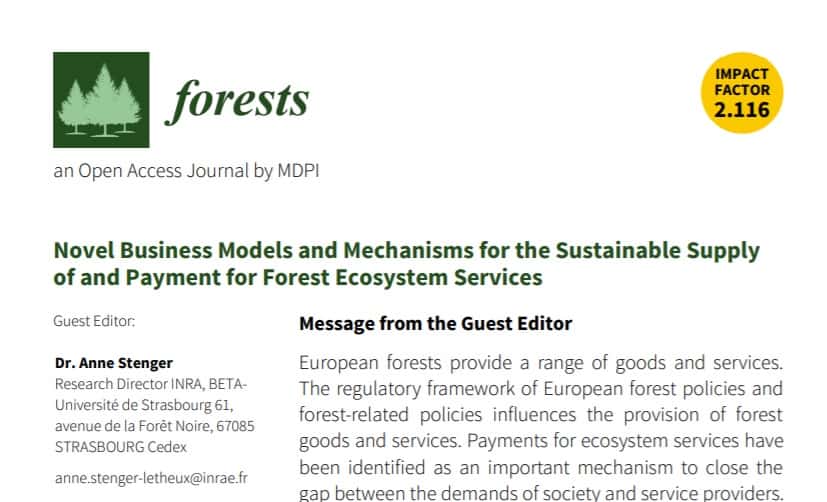European forests provide a range of goods and services. Some are valued by existing markets and others, like “public goods” or “common-pool resources”, are not, and so land owners are not rewarded for their provisions by the markets. The regulatory framework of European forest policies and forest-related policies (e.g., EU 2020 Biodiversity Strategy, EU 2030 Climate and Energy Policy Framework) influences the provision of forest goods and services. In recent years, there have been several initiatives to increase society’s awareness of ecosystem services and to discuss mechanisms to pay for sustaining them. Payments for ecosystem services (PES) have been identified as an important mechanism to close the gap between the demands of society and service providers. Whichever mechanism or business model is adopted, an important element for a functioning PES approach is that those who pay are aware that they are paying for an ecosystem service that is valuable to them and those who receive the payments engage in management activities that secure the supply of ecosystem services. The objectives of this Special Issue are to better analyze public and private financing mechanisms for the enhanced provision of these forest externalities in Europe, develop options for market-based mechanisms, present best practice examples, and prepare strategies and guidelines for policy-makers in order to implement new mechanisms and to foster the provisioning of ES. In particular, one interesting focus can be to develop novel public policies, business models, and mechanisms to “internalize” the proven socioeconomic value of forest ecosystem services (“externalities”) and contribute to their sustainable supply, considering the multitude of ecosystem services of European forests. Another one is to develop mechanisms for the payment of ecosystem services at the appropriate level of forest management and administration and combine public policy tools with business models.
This issue will focus on the interface between management planning and environmental economics and policy analysis using existing and novel tools and models to address the supply of a wide range of ecosystem services. Identifying the most suitable business models for a given socioeconomic, ecological, and political situation and fostering a sustainable management remains an ambitious goal.
Dr. Anne Stenger
Guest Editor

Manuscript Submission Information
Manuscripts should be submitted online at www.mdpi.com by registering and logging in to this website. Once you are registered, click here to go to the submission form. Manuscripts can be submitted until the deadline. All papers will be peer-reviewed. Accepted papers will be published continuously in the journal (as soon as accepted) and will be listed together on the special issue website. Research articles, review articles as well as short communications are invited. For planned papers, a title and short abstract (about 100 words) can be sent to the Editorial Office for announcement on this website.
Submitted manuscripts should not have been published previously, nor be under consideration for publication elsewhere (except conference proceedings papers). All manuscripts are thoroughly refereed through a single-blind peer-review process. A guide for authors and other relevant information for submission of manuscripts is available on the Instructions for Authors page. Forests is an international peer-reviewed open access monthly journal published by MDPI.
Please visit the Instructions for Authors page before submitting a manuscript. The Article Processing Charge (APC) for publication in this open access journal is 1800 CHF (Swiss Francs). Submitted papers should be well formatted and use good English. Authors may use MDPI’s English editing service prior to publication or during author revisions.
